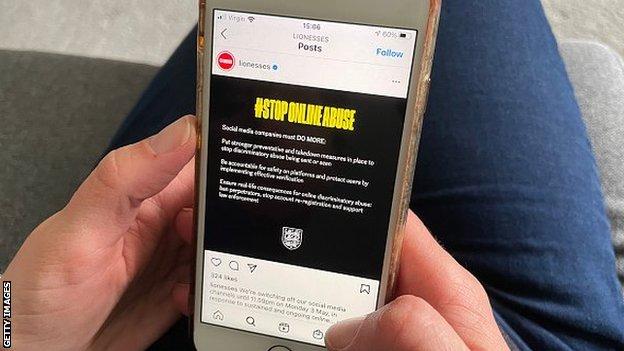
According to a new report, Homophobia is responsible for a lot of abuse aimed at basketball and football players.
Of the more than 1,500 abusive posts included in the report, 40% of them were directed at male football players, 27% at female football players and 26% at male basketball players.
Racist and sexist messages were sent to the athletes.
The unions representing male and female athletes in football and basketball commissioned Signify to conduct a report into online abuse and its impact on performance and mental health.
1,555 abusive posts were sent from 1, 455 unique accounts.
Between May and September of this year, 160 of the most high-profile male and female football and basketball players in Europe, the United States and South America were directed to posts on the social media site.
The report focused on "targeted online abuse" - messages that were directed at or include the account handle of a player so the player may see it.
According to the report, the abuse that affects players across sports and gender is found in both their workplace and family environment.
The report states that the abusive messages were targeted at players who were not known to be gay.
According to the report, they are often targeted for their support of lesbian, gay, bisexual and queer issues. The players in the study received a lot of homophobia.
The players were subjected to hostile interrogations of their sexuality based on what style of clothes they wore.
The most abused male footballer, who is not named, received exclusively LGBT-phobic abuse because of his support for the community. Many of the most high profile athletes in their sports are included in the report.
Sexism and homophobia accounted for 90 percent of the messages aimed at female players.
The report said that players are vulnerable to targeted abuse due to their political stances.
29% of women's players received online abuse because of their political stances, as opposed to in-game events or incidents.
42% of abuse directed at male players and 18% of abuse sent to female players are related to homophobia.
There were sexist abusive posts to the players.
According to the report, athletes' mental well-being, lifestyle and performance were all affected by the abuse.
It is possible for players to be abused by followers of their own team accounts.
A lack of regulation and oversight is exposed by the fact that a clear majority of abuse can still be found online.
The unions say "industrial action" is needed to protect players, which could include a combined campaign to raise awareness about the issue, rather than a strike or further boycott of platforms.
Leading sports called on social media companies to combat abuse on their platforms last year. The Signify report showed a decline in abuse after the football season ended.
"We're confident that we will start to see more proactive, real-world solutions protecting players from the poison of online abuse."
In response to the report, a person for the social media platform said that they are committed to fighting abuse that is motivated by hatred, prejudice or intolerance.
The abuse or harassment of people on the basis of race, ethnicity, gender, gender identity or sexual orientation is not acceptable.
More than 50% of violative content is surfaced by our automated systems.
We know there is still more we can do to give people more control over their safety.
The report was important in order for everyone to understand the scope of the abuse and its impacts.
She said that everyone needs to move forward to protect our athletes so they feel safe to share their genuine personality on these social media platforms with fans and business partners alike.
Additional reports by Sarah.